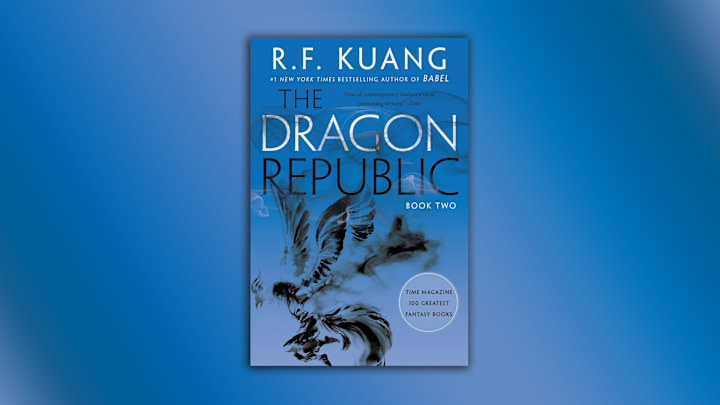This review contains SPOILERS for the first two books of The Poppy War series by R.F. Kuang.
The Dragon Republic is the middle book of R.F. Kuang’s excellent The Poppy War series. The author published the first book in the series at the age of 21, and the second book shows significant improvement in many areas of her writing style.
The story of The Dragon Republic is more interesting and relies more on character and story development than on the mysticism, which was the weakest part of the first book. Chinese history still plays a major role in The Dragon Republic, and Kuang masterfully weaves real events and people into her story, seamlessly integrating them within her fictional fantasy world.
Yin Vaisra certainly shares similarities with Chiang Kai-shek, the leader of the Nationalist Party in China during the 20s and 30s. Vaisra, the Dragon warlord, is trying to overthrow the imperial government and launched a military campaign north, toward Sinegard. This occurrence is clearly based on Chiang Kai-shek’s Northern Expedition in 1926.
On the surface, Vaisra wanted to unite the country, overthrow the Empress, and form a republic under his leadership, much as Chiang did in real life.
The Hesperians represent the British presence that was so pervasive in the 19th and 20th centuries. The British played a significant role in China’s production and wide distribution of opium, and so do the Hesperians in the story. However, the details are greatly fictionalized to fit the story’s narrative.

Rin’s character development shows tremendous growth in The Dragon Republic
In The Poppy War, Rin was a character the reader could sympathise with, at least for the first half of the book. She was naive, innocent, and quirky. Readers couldn’t help but like her. But that changed when she gained her powers through the Phoenix god. Slowly, anger and hate overtook her personality, and through her god, she became more than a well-trained warrior and officer.
When she destroyed the islands that made up the Federation of Mugen, including the women and children, her character seemed irredeemable. In the beginning of The Dragon Republic, she and the Cike (shamans) were merely mercenaries, and Rin wasn’t a good leader. After burning one of her cohorts during a mission, that shaman and another left her squad of Cike.
Rin was lost and angry, her character caught up in the deeds of her past. Vaisra recruits her for a mission to assassinate the Empress, but in the course of that attempt, the Empress blocks her access to her god, taking away Rin’s power over fire.
With the loss of her powers, Rin’s character is given the room to grow and develop. Too much has happened to her to be a normal person, but she embraces the opportunity to be a warrior fighting for a democratic republic without using her powers.
This is also an opportunity for characters around her to grow and for the overall story to develop in a more structured way. Nezha, Kitay, and Venka all get the chance to bring more to the story than they did before.
When Rin regains her powers by anchoring herself to Kitay, who would funnel the power of the Phoenix to her through himself, she is better prepared to handle her powers. She’s matured, and with Kitay’s help, she’s able to control and focus her powers in more productive ways than just letting go with anger and hate.
Gut-wrenching betrayals further mold Rin into what she must become. Her character is so much more complex than it was at the beginning of this book, and the last of her innocence is stripped away from her in the most brutal way.
Verdict
The Dragon Republic is a much better read than its predecessor. It read much more easily, and Rin ingrains herself with the reader in a way that disappeared midway through The Poppy War. She is much more likable by the end of this book than she was at the beginning, and it was a terrific decision on Kuang’s part to give Rin and some of the characters room to develop in a way that advanced and improved on the narrative and the characters.
The final installment of this series is The Burning God, and it will be exciting to see how Rin’s story plays out.
